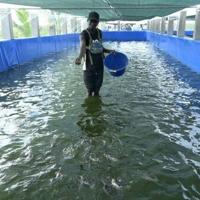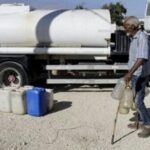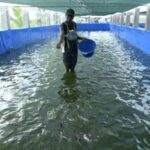The town of Kayar in Senegal is located near the Atlantic Ocean but relies on a farm further inland for its fish production.
The farm was started around 15 years ago by Khadidiatou Sar Seck, a pioneer in the West African country where fishing is crucial to the national identity.
Fish makes up over 70 percent of household protein consumption, and the fishing industry provides around 600,000 direct and indirect jobs in a population of 18 million.
However, due to overfishing, illegal fishing, and global warming, the once abundant fish resources are becoming scarce.
The volume of catches by traditional wooden fishing canoes dropped by 58 percent between 2012 and 2019, according to the Environmental Justice Foundation (EJF).
With rising prices and unemployment, many Senegalese struggle to afford this essential food source.
Reports of migrants attempting the dangerous journey from Senegal to Spain’s Canary Islands are common, with many being fishermen or coastal residents reliant on the fishing industry.
The government aims to promote fish farming and attract investment to the industry.
– Untapped potential –
The fisheries minister, Fatou Diouf, expressed the goal of aquaculture significantly contributing to the country’s marine production for food sovereignty.
President Bassirou Diomaye Faye has prioritized food sovereignty since taking office in March.
Despite Africa’s vast potential, it only contributes around 1.9 percent of global aquaculture production, while Asia accounts for 91.4 percent.
Aquaculture has struggled to grow in Senegal, despite efforts to promote it since 2006.
Seck faces challenges such as lack of awareness among the Senegalese population, difficulty in finding quality varieties, and expensive feed imports for farmed fish.
The national aquaculture agency aims to ramp up production and create jobs in the industry.
– ‘No more fish’ –
Some fishermen are skeptical about fish farming, citing foreign trawlers depleting sea resources and potential price competition.
However, others like Alioune Badara, a former fisherman, are open to the idea of fish farming due to the declining sea resources.





